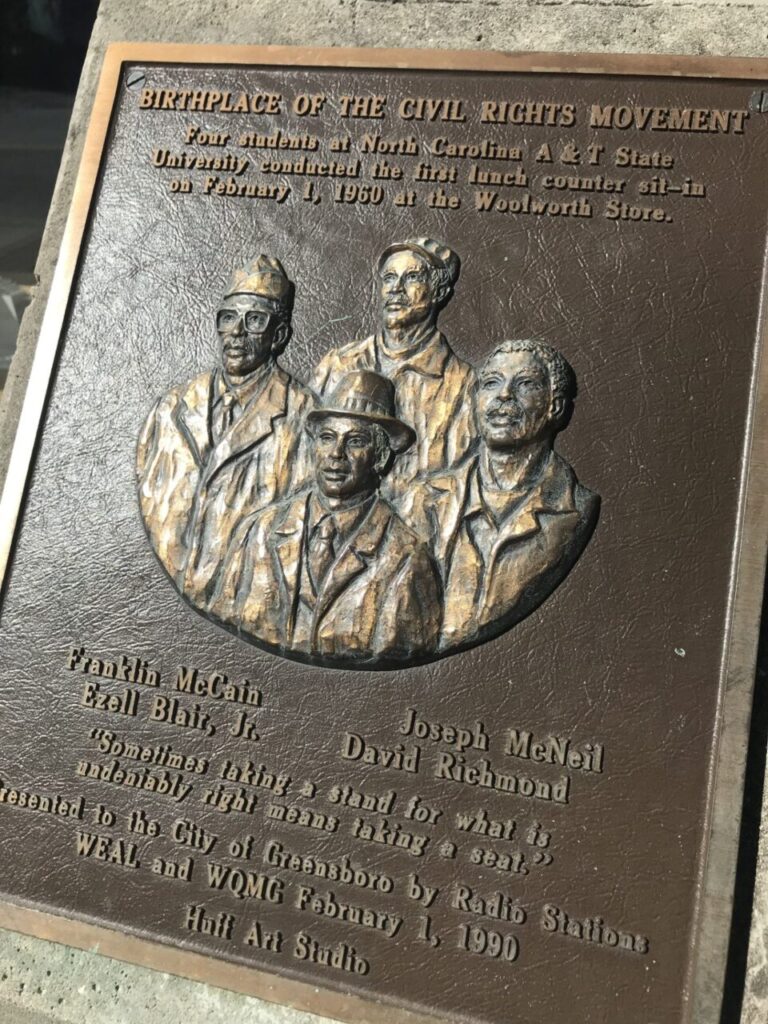The Power of One Voice: Lessons from the Greensboro Four

Introduction: The Courage to Step Forward
In 1960, four young men in Greensboro, North Carolina, sat down at a Woolworth’s lunch counter, defying the entrenched segregation of the Jim Crow South. Their peaceful protest sparked a movement that galvanized students and communities across America. Today, their courage reminds us that the smallest actions, born of conviction and faith, can inspire monumental change.
Through my one-man theatrical show, One Voice: A Black History Narrative, I reflect on moments like this, asking audiences a pivotal question: What can you do, with your one voice, to positively impact your household, school, community, and beyond?
The Greensboro Four: A Timeline of Courage
The story of the Greensboro Four—Ezell Blair Jr. (later Jibreel Khazan), David Richmond, Franklin McCain, and Joseph McNeil – is one of careful preparation and steadfast resolve.
- The Preparation:
In the weeks leading up to February 1, 1960, these four North Carolina A&T State University students planned their action with purpose. They studied civil disobedience, inspired by leaders like Dr. Martin Luther King Jr., who preached nonviolence as a powerful tool for change. - The Sit-In:
Dressed in their best, carrying money to pay for their meals, the young men entered Woolworth’s, sat at the “whites-only” counter, and politely asked to be served. When denied service, they remained seated, embodying dignity and discipline. - The Aftermath:
Their actions quickly gained traction. By the next day, more students joined the sit-in. Within weeks, similar protests spread to over 55 cities in 13 states. This wave of activism became a turning point in the Civil Rights Movement, proving that organized, peaceful resistance could lead to systemic change.
Parallels to Everyday Heroism
The bravery of the Greensboro Four mirrors countless others who have stepped forward in their communities to challenge injustice. These weren’t always headline-grabbing acts; sometimes, they were quiet decisions to do what’s right:
- A mother choosing to send her child to a newly integrated school despite threats.
- A pastor opening his church to meetings for civil rights organizers.
- A young person standing up against hate speech in their classroom.
Dr. Martin Luther King Jr. captured this spirit in his words:
“Faith is taking the first step even when you don’t see the whole staircase.”
The Greensboro Four, like so many others, exemplified this faith, stepping into the unknown with the belief that justice would prevail.
Bringing Black History to Life: The “One Voice Show”
Through One Voice: A Black History Narrative, I bring stories like these to audiences, not just as history lessons but as calls to action. Using first-hand accounts, historical quotes, and video testimonials from local heroes, my show connects the past to the present, challenging audiences to find their own “one voice.”
Here’s what you can expect:
- Dramatic Storytelling: Authentic portrayals of historical figures, including Dr. King and Frederick Douglass.
- Personal Reflections: Stories from those who lived through the Civil Rights Movement, sharing their resilience and hope.
- Interactive Inspiration: Opportunities for audiences to reflect on their role in shaping their communities today.
Why It Matters: Black History is American History
The Greensboro Four remind us that Black history is not a separate narrative – it’s an integral part of America’s story. Their courage underscores the power of individuals to influence change, no matter how daunting the challenge.
As we reflect on their bravery, let us ask ourselves:
- What injustices persist in our communities?
- How can we use our resources, talents, and voices to make a difference?
Take the Next Step
If you’re an educator, corporate leader, or community organizer looking to enrich your group’s understanding of Black history and inspire meaningful dialogue, consider hosting a One Voice Show. Whether in-person or virtual, these experiences offer a profound way to connect history to today’s challenges.
Learn more and book your experience at onevoiceshow.com.
Conclusion: The Legacy of One Voice
The Greensboro Four didn’t wait for a perfect moment – they acted with courage and faith, proving that one voice, joined by others, can transform a nation. What will your one voice accomplish?
Let’s honor their legacy by taking steps, big or small, to create a more just and equitable world.